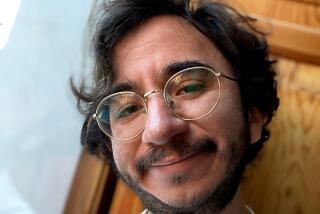Fleischman Wins Newbery
Maybe Sid Fleischman should take more showers. “There’s a call from Chicago,” his wife, Betty, told him while he was sudsing away the week before last. “I don’t know anybody in Chicago,” he called back. After he had dried off, the Santa Monica writer called back and learned the telephonic missive had not been a plea to speak at some conference or convention. (“Children’s writers are called on a great deal for speeches,” Fleischman explained.) Instead, it was the American Library Assn., wanting to inform the 66-year-old scribe that he had just won the John Newbery Gold Medal for children’s literature. “If there was pizzazz to it, it would be the Academy Award of children’s literature,” Fleischman said, overjoyed that after “I think it’s 34” books for young people, he had finally earned top honors. “You can imagine, it had to go through brain cells when they told me I’d won,” Fleischman said. “You don’t expect something like this to come. Then I realized, my God, it’s happening to me.” Illustrated by Peter Sis and published by Greenwillow Books here, “The Whipping Boy,” Fleischman’s winning tale, takes its inspiration from the royal houses of Europe, “where,” said the author, “the prince, the heir to throne, couldn’t be punished. So if they had a rotten prince, they installed a commoner off the streets, and he took the punishment for the prince.” As the onetime vaudeville magician and former writer of adult nonfiction recalled, “The injustice of it enraged me. The lunacy of it! So I couldn’t let go of this idea, even though I couldn’t think of a way to tell the story.” Fleischman struggled with the story for 10 years, until finally “I realized the story wanted to write itself a little longer, so I just let it go. Once I took off the straitjacket I had put on the story, it just exploded, and I had great fun writing it.” Credibility is one of the fringe benefits of a prize like the Newbery Award, Fleischman said, for winning it focuses more attention on the entire genre of children’s literature. “I am absolutely persuaded that the best books being published today are in the children’s field,” he contends. Also, Fleischman’s victory is a particularly happy occasion for his family, since several years ago his son Paul picked up the silver Newbery for his book “Graven Images.” Said Paul’s father, noting that, in fact, he wrote his first children’s book as a vehicle to amuse the three Fleischman offspring: “Our styles are completely different. His work is very Hawthornean. My stuff is rather broad and comic. But I deal with serious things, as I suppose all comic writers do.”
Both the Newbery and the Randolph Caldecott Medal, honoring the year’s most distinguished American picture-book for children, are awarded by the Association for Library Service to Children, of the American Library Association. This year’s Caldecott went to Richard Egielski, illustrator of “Hey, Al” (Farrar, Straus & Giroux), written by Arthur Yorinks.
NEW KNOPF EDITOR--Indian-born British editor Ajai Singh Mehta has been named president and editor-in-chief of Alfred A. Knopf, succeeding Robert A. Gottlieb, who has been named editor of The New Yorker magazine. Both the publishing house and the magazine are owned by the Newhouse Newspapers company.
Mehta, 44, has been publishing director of Pan Books Ltd., Britain’s largest paperback publisher, and was recommended for his new position by Gottlieb. The two editors are expected to be installed in their new positions by the end of March.
STILL SELLING AFTER ALL THESE MONTHS: The gargantuan success of Doubleday’s hardcover version of “Fatherhood” has prompted Berkley to plan for a first-print run in paperback of between 1.5 million and 2 million copies. Bill Cosby’s slender volume on the joys and travails of paternity will be released as a $6.95 trade paperback.
CORPORATE SCORECARD: “Your conscience will be happy,” said one person close to “Rating America’s Corporate Conscience” (Addison-Wesley), “but your waistline won’t.” That’s because Haagen-Dazs ice cream, among the products manufactured by 131 of the country’s leading corporations, ranks high on the social-responsibility scale outlined in the book by Steven D. Lydenberg, Alice Tepper Marlin and Sean O’Brien Strub of the Council on Economic Priorities. “You won’t have to give up chocolate-chocolate-chip,” our socially conscious friend said, her voice filled with (ugh) bittersweet relief. The book’s ratings are based on such criteria as involvement in South Africa, the number of women and minority directors and officers and the size of charitable contributions. In Marlin’s view: “We cast an economic vote whenever we buy a product or invest in a company.”
More to Read
Sign up for our Book Club newsletter
Get the latest news, events and more from the Los Angeles Times Book Club, and help us get L.A. reading and talking.
You may occasionally receive promotional content from the Los Angeles Times.






